Duke Initiatives in Theology and the Arts (DITA) is celebrating its first decade at Duke Divinity School, a perfect time to reflect on its transformative leadership in promoting a vibrant interplay between Christian theology and the arts.

The initiative was established in 2009 by current director Jeremy Begbie, Thomas A. Langford Distinguished Professor of Theology, a leading voice in the international conversation between faith and the arts.
In the past 10 years, DITA has developed graduate-level courses in theology and the arts and welcomed doctoral students, hosted a distinguished lecture series and numerous concerts and exhibitions, and participated in a trans-Atlantic collaboration with the University of Cambridge (U.K.).
Through its numerous programs, DITA promotes and encourages rigorous scholarship, imaginative teaching, and creative artistic expression that fosters the biblical vision of a new creation in Jesus Christ. DITA has shown how the arts can be powerful media of theological truth.
A Vibrant Vision
DITA has a foundational commitment to theology through the arts and the arts through theology. The arts do not just illustrate theology but are themselves modes of theological expression. That means that the arts are more than pretty pictures or nice music or interesting dance—they are more than just “something extra” for human existence and theological expression.
Rather, art shapes the imagination of faith communities. Art provides ways to express belief and theology. And art provides the forms through which many people encounter the gospel.
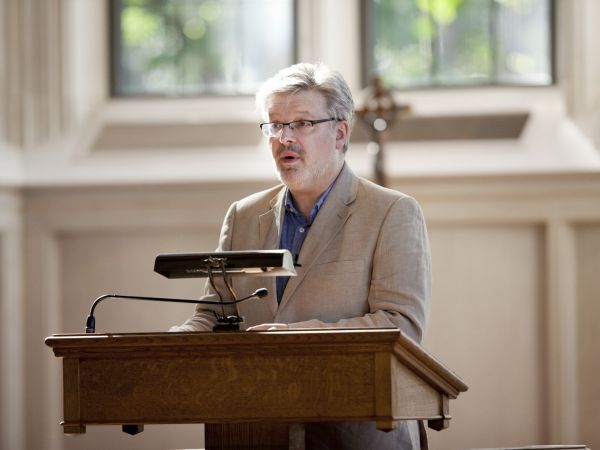
In 2010, the Duke-Cambridge Consultation was launched with scholars Sarah Coakley, Norris Hulse Professor of Divinity at the University of Cambridge; David Ford, Regius Professor of Divinity at the University of Cambridge; Ray Barfield, professor of pediatrics and Christian philosophy at Duke; Jeremy Begbie, Thomas A. Lanford Distinguished Professor of Theology at Duke Divinity School; Richard Hays, George Washington Ivey Professor of New Testament at Duke Divinity School; Ellen Davis, Amos Ragan Kearns Professor of Bible and Practical Theology at Duke Divinity School; Alan Torrance, professor of systematic theology at the University of St. Andrews (Scotland), and Micheal O’Siadhail, a poet from Ireland.
The consultation commissioned a new St. Luke Passion by James MacMillan, a leading Scottish composer and conductor whose work has been commissioned by Mstislav Rostropovich, Evelyn Glennie, the Welsh National Opera, the London Symphony Orchestra, the Boston Symphony Orchestra, Westminster Cathedral, and more.
He was given the British Composer Award for Liturgical Music in 2008. Preparation for the commission included four years of interdisciplinary dialogue, including an examination of the biblical text, discussion about theological themes, and conversation about music and poetry.
“Bach’s music proves that the Passion of the Christ has deep beginnings and profound resonance, even for modern man; he opened up a window to the divine love affair with humanity. The greatest calling for an artist, in any age, is to do the same.”
The U.S. premiere of MacMillan’s St. Luke Passion was on Palm Sunday, April 13, 2014, at Duke Chapel at Duke University. The Duke Chapel Choir, the Durham Children’s Choir, and the Riverside High School Choir joined the Orchestra Pro Cantores under conductor Rodney Wynkoop to present an immersion in the Gospel of St. Luke.
The Passion is filled with the character of MacMillan’s composition—harmony and discord, contemplation and surprise—to capture the drama, emotion, and tension in the biblical text. MacMillan’s St. Luke Passion premiered in the U.K. at King’s College, Cambridge.
Research That Reinvigorates
DITA is far more than a performing arts program or host for artists and musicians. The mission of DITA has always included a commitment to groundbreaking research and scholarship that inspires leaders to see faith and art and intertwined and inseparable.
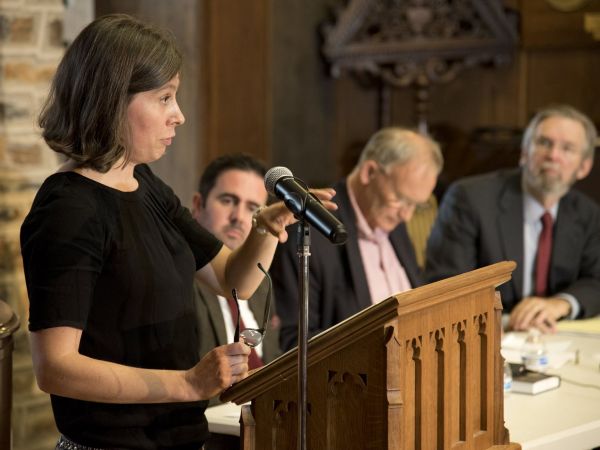
The Theology, Modernity, and the Arts (TMA) project has grown out of the Duke-Cambridge consultation to include research in three main areas: music, visual arts, and literature. Launched in 2015 and generously funded by the McDonald Agape Foundation, TMA will produce a series of publications, commissioned art works, and online resources.
TMA is grounded in the beliefs that art bears witness to theological dynamics that have shaped modernity; art gives voice to questions that call for a response rooted in the theology of new creation; art moves beyond intractable dilemmas in modern theology; and the theme of new creation as realized in Jesus Christ can develop important theological trajectories in modernity.
DITA director Jeremy Begbie also continues to publish highly regarded books on theology and music. His most recent publications include Redeeming Transcendence in the Arts: Bearing Witness to the Triune God (Eerdmans) and A Peculiar Orthodoxy: Reflections on Theology and the Arts (Baker).
“Jeremy Begbie has been a central and seminal figure in the recent revolution in theology and the arts. Begbie’s argument here both learned and lucid, is that only when we allow for a more explicitly biblical and Trinitarian vision of God will the vague claims for transcendence in the arts begin to make sense. This book will challenge and illuminate the whole field.”
Teaching That Transforms
Teaching is at the heart of DITA’s work. As part of the mission of Duke Divinity School, DITA takes seriously the call to train future leaders in theology and the arts for work in the church, academy, and world. Wherever students may go on to lead, they will be transformed in their understanding of the vibrant interplay between theology and the arts.
DITA delivers the certificate in theology and the arts to help students recognize and put into practice the mutually enriching integration of theology and the arts. The certificate is available to students in the M.Div., M.T.S., Th.M., or M.A. programs at Duke Divinity School. Within the doctor of theology (Th.D.) program at Duke, students can pursue a concentration in theology and the arts, working with Professor Jeremy Begbie and others.

“At Duke, I have had the opportunity to test out and discover how to use my creative talents in proclaiming the gospel. Whether it is a dynamic reading of Scripture, weaving music throughout a sermon, or creating word pictures to teach Sunday school, I am much more confident that art and ministry complement each other.”
Art in Action
Over the years, DITA has put art into action through performances, art installations, and other events that contribute to a vibrant arts culture at Duke Divinity and serve the wider art community at Duke, in Durham, and farther afield in the United States and Europe.
Exhibitions in collaboration with Duke Chapel and the Nasher Museum of Art at Duke University include “Beauty Given by Grace: Biblical Prints of Sadao Watanabe” (1913–1996); Miserere et Guerre, a series of 58 intaglio prints by French artist Georges Rouault (1871–1958); and “QU4RTETS: Engaging Eliot” with artists Makato Fujimura and Bruce Herman and a musical composition by Christopher Theofanidis.
Artists in residence have included Makoto Fujimura and Bruce Herman, whose work “Riven Tree” now hangs in the York Room of Duke Divinity School. A number of musical works have been commissioned, most recently a composition by acclaimed Chinese composer Lu Pei that was inspired by Blood Letters, the story of Chinese Christian martyr Lin Zhao by Duke Divinity professor Xi Lian.
And DITA has hosted numerous distinguished lectures, conferences, and musical events in the past decade, all contributing to the rich tapestry of artistry and scholarship that has enlivened the conversation between theology and the arts.
“What DITA is doing here is essential. As an artist you can feel like you’re on an island alone, and it’s not right in art or as a believer to be alone in what you do.”
Celebrating the Past, Looking Toward the Future
DITA is launching its next decade with a multiday event, DITA 10, that will celebrate past scholarship, reflect on today’s landscape, and imagine with tomorrow’s leaders. Featuring internationally recognized scholars and artists including Kate Bowler, N.T. Wright, Lanecia Rouse Tinsley, Carlos Colón, Malcom Guite, and many more, DITA 10 will offer workshops for church leaders and artists, workshops for emerging leaders in the theology and the arts, conversations between artists and theologians, and corporate worship sessions.
To learn more about DITA, including information about academic programs and events, visit https://divinity.duke.edu/initiatives/dita.
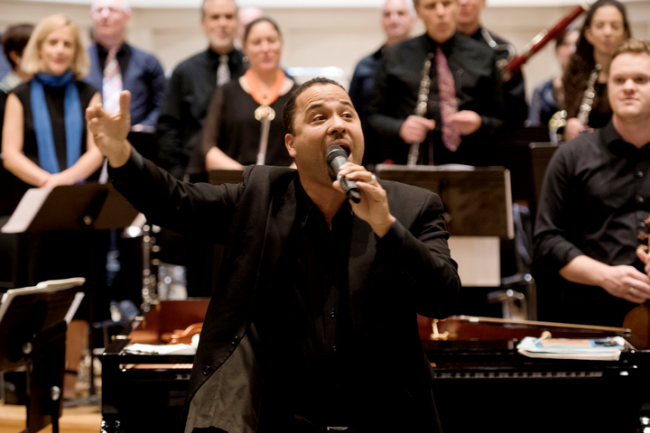
Musicians of faith, including Dean of Duke Chapel Luke Powery, unlocked the rhythm of the Gospel in “Home, Away, & Home Again.”
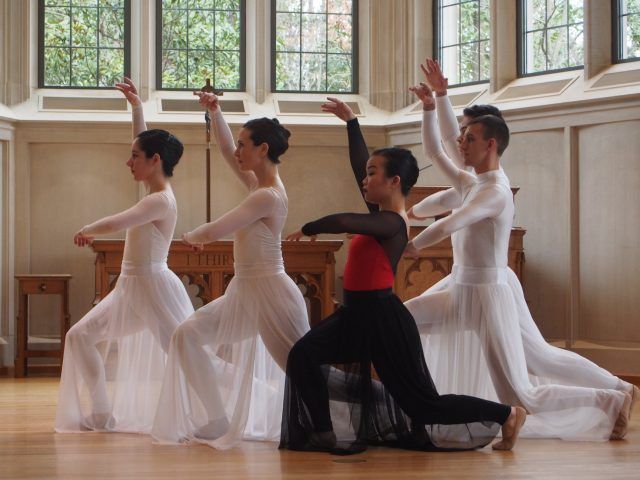
Ekklesia Contemporary Ballet performed interpretations of Psalms at a Goodson Chapel service.
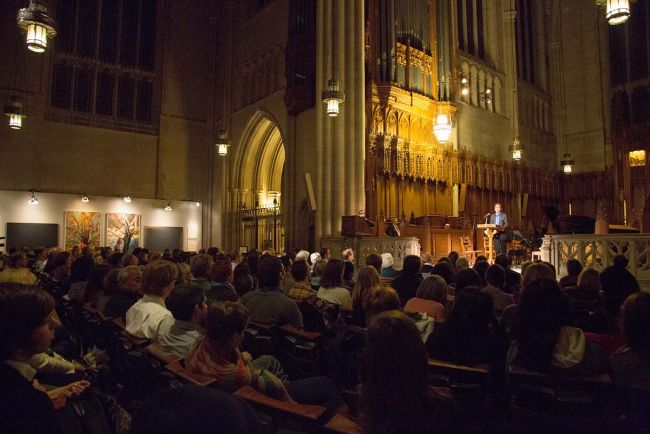
“Engaging Eliot: Four Quartets in Word, Color, and Sound” featured artists Bruce Herman and Makoto Fujimura and musical performances in Duke Chapel.
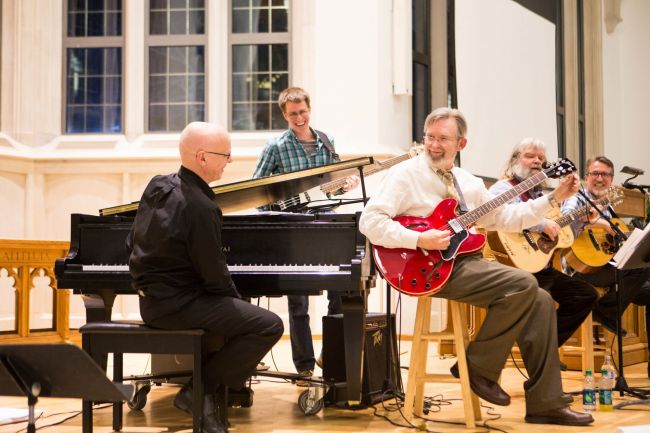
“Word Made Fresh” featured poet Malcolm Guite with musicians Jeremy Begbie and Richard Hays from Duke Divinity School and guitarist Steve Bell.
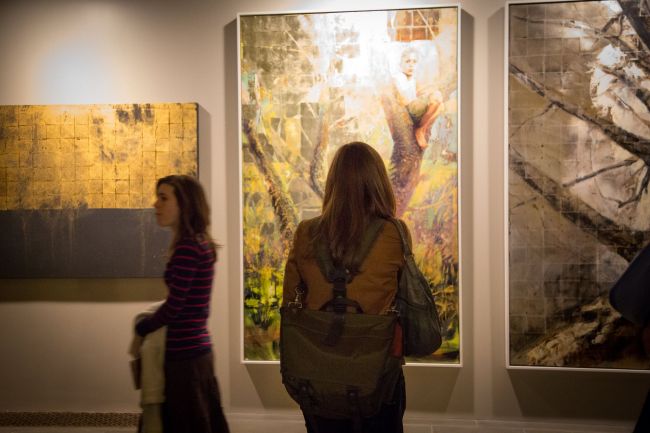
Work by artists Bruce Herman and Makoto Fujimura was exhibited at Duke Chapel as part of the “Engaging Eliot: Four Quartets in Word, Color, and Sound” event.
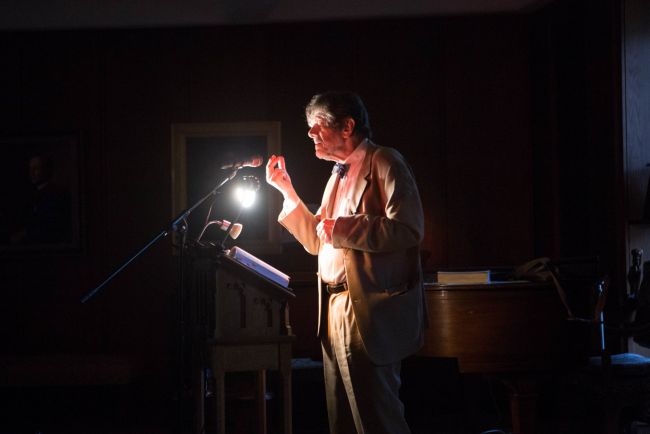
Acclaimed Irish poet Micheal O’Siadhail reads the title poem from his book, “Our Double Time.”
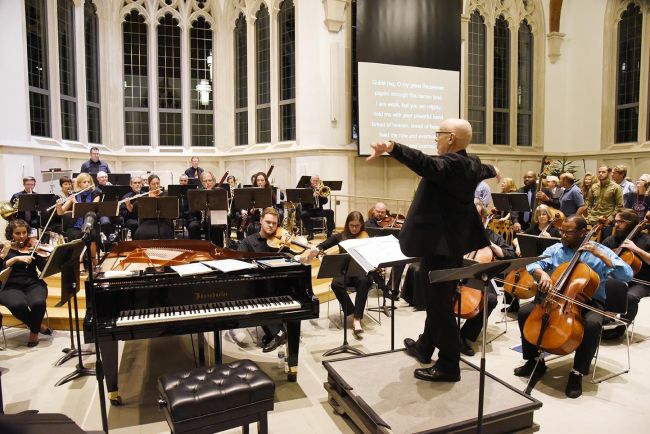
DITA hosted an evening dedicated to honoring the legacies of martyrs, “Performing Faithfully: Music & Martyrdom.”
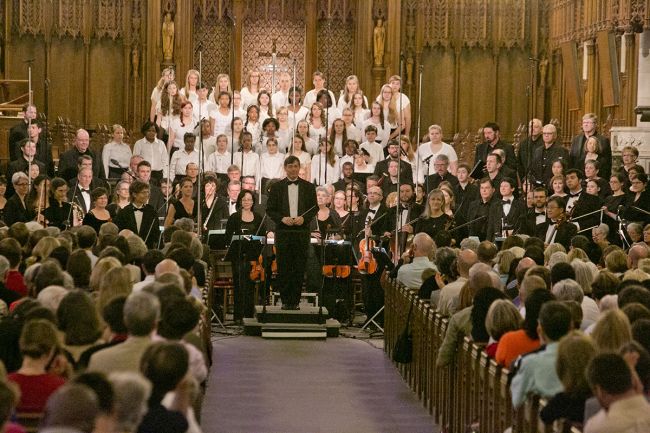
MacMillan’s St. Luke Passion had its U.S. premiere at Duke Chapel in 2014 and its U.K. premiere at King’s College, Cambridge, in 2015.